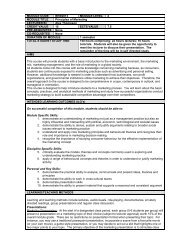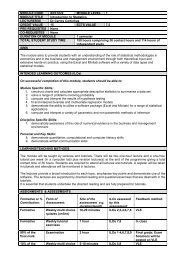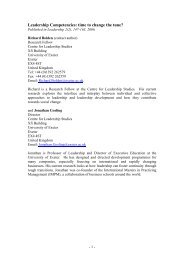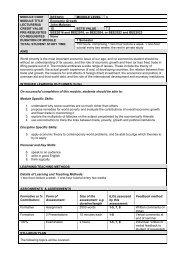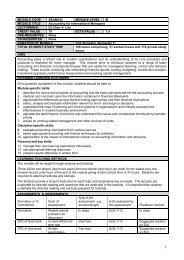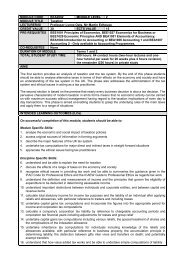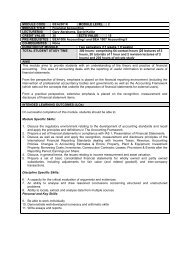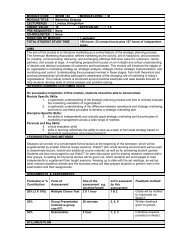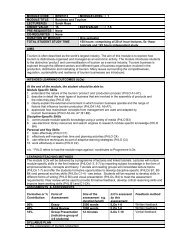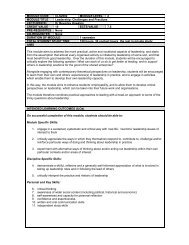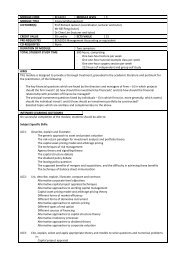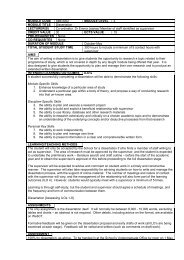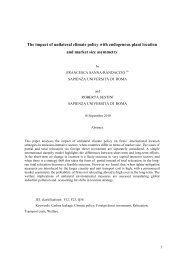What is Leadership? - The Business School - University of Exeter
What is Leadership? - The Business School - University of Exeter
What is Leadership? - The Business School - University of Exeter
Create successful ePaper yourself
Turn your PDF publications into a flip-book with our unique Google optimized e-Paper software.
initially) through improved<br />
communication, motivation, morale and<br />
team working. Related measures that<br />
may be affected include decreased<br />
absentee<strong>is</strong>m and staff turnover,<br />
increased willingness to work overtime,<br />
and enhanced participation,<br />
accountability and suggestions/feedback.<br />
A third level <strong>of</strong> effect can be seen at an<br />
organ<strong>is</strong>ational level. Indeed, improving<br />
organ<strong>is</strong>ational effectiveness <strong>is</strong> <strong>of</strong>ten the<br />
key driver behind investment in<br />
management and leadership<br />
development. At th<strong>is</strong> level <strong>of</strong> impact, it<br />
<strong>is</strong> intended that through development <strong>of</strong><br />
a critical mass <strong>of</strong> effective leadership in<br />
different parts <strong>of</strong> the organ<strong>is</strong>ation, the<br />
organ<strong>is</strong>ation as a whole becomes more<br />
successful. Such impacts may well be<br />
revealed in hard measures such as<br />
improved pr<strong>of</strong>it, turnover and share<br />
value and reduced wastage; however a<br />
wide array <strong>of</strong> other measures could be<br />
considered, including customer<br />
sat<strong>is</strong>faction, relationship with suppliers,<br />
organ<strong>is</strong>ational culture and innovation.<br />
Whilst most consideration <strong>of</strong> the impact<br />
<strong>of</strong> MLD stops at the organ<strong>is</strong>ational level,<br />
the commitment <strong>of</strong> national and regional<br />
government to enhance MLC indicates<br />
that the potential impact <strong>of</strong> effective<br />
leadership can traverse organ<strong>is</strong>ational<br />
boundaries. By building the capability<br />
and performance <strong>of</strong> organ<strong>is</strong>ations within<br />
a specific geographic area (be it regional,<br />
national or international) much larger<br />
scale impacts are possible (including<br />
economic, social and environmental).<br />
In short, leadership and leadership<br />
development can have an effect at many<br />
levels and there are a host <strong>of</strong> factors,<br />
besides simple financial measures, upon<br />
which they impact.<br />
Another key thing to consider when<br />
attempting to monitor the performance<br />
impact <strong>of</strong> management and leadership,<br />
<strong>is</strong> the likely time delay for v<strong>is</strong>ible<br />
improvements. Thus, for example, it will<br />
be far easier to measure the impact <strong>of</strong><br />
an MLD initiative in terms <strong>of</strong> staff<br />
attitudes rather than changes in<br />
productivity as the latter will be slow to<br />
achieve and will be subject to a much<br />
wider range <strong>of</strong> influencing factors 2 .<br />
<strong>The</strong> remainder <strong>of</strong> th<strong>is</strong> article will consider<br />
the empirical evidence for a link between<br />
management, leadership and<br />
performance at different levels 3 .<br />
<strong>The</strong> relationship between MLD,<br />
individual capability and<br />
performance<br />
Whilst it <strong>is</strong> widely assumed that MLD will<br />
enhance individual capability and<br />
subsequently performance, the evidence<br />
implies a more complex interaction.<br />
Keep and Westwood (2003), for<br />
example, argue there <strong>is</strong> little evidence<br />
that the current supply <strong>of</strong> MLD <strong>is</strong><br />
addressing the right skills, improving<br />
capability or enhancing performance.<br />
Bramley (1999) in a wide review <strong>of</strong> the<br />
evidence likew<strong>is</strong>e found little support<br />
neither for the impact <strong>of</strong> <strong>of</strong>f-the-job<br />
management education nor for generic<br />
management courses. He did, however,<br />
conclude that the most useful kinds <strong>of</strong><br />
development relate to work-based<br />
activities such as giving and receiving<br />
detailed feedback, goal setting and<br />
action planning.<br />
Boyatz<strong>is</strong> (1993) revealed concerns about<br />
a possible break in the supposed chain <strong>of</strong><br />
causality, whereby he d<strong>is</strong>covered that<br />
simply having leadership competencies<br />
does not mean that you will use them.<br />
He went on to argue that MLD should<br />
thus aim to encourage and support<br />
people to take on leadership roles and<br />
2 In a review <strong>of</strong> international performance<br />
indicators the DTI <strong>is</strong> considering using<br />
measures <strong>of</strong> perceived quality <strong>of</strong><br />
management due to the absence <strong>of</strong> any more<br />
objective measurements (see www.hmtreasury.gov.uk/media//97626/productivitych<br />
s.pdf for more details). In addition, recent<br />
research at the Institute <strong>of</strong> Work Psychology,<br />
<strong>University</strong> <strong>of</strong> Sheffield has found a strong<br />
correlation between self-report measures <strong>of</strong><br />
organ<strong>is</strong>ational performance and objective<br />
measures such as productivity and pr<strong>of</strong>it,<br />
thus supporting the use <strong>of</strong> th<strong>is</strong> relatively<br />
easy-to-collect data in studies <strong>of</strong><br />
organ<strong>is</strong>ational performance.<br />
3 Th<strong>is</strong> review draws heavily on a review<br />
conducted by the Management and<br />
<strong>Leadership</strong> Development Research Network<br />
(Burgoyne et al., 2004).<br />
20 www.leadershipsouthwest.com



